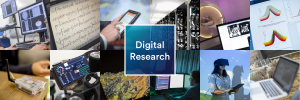Digital Research
View this author's profilePosts by Digital Research
Introducing Ada, the University of Nottingham’s new, most powerful HPC service
June 7, 2024
As one of the UK’s leading research universities, we are renowned for the strength, quality and breadth of our research and teaching capabilities. To further bolster our commitment to research excellence, we are delighted to share that we have implemented a new, state-of-the-art High-Performance Computing (HPC) system. The names of the new facility, “Ada”, is …
Accelerating the University’s research ambitions with a more powerful HPC service
May 15, 2023
The University’s High Performance Computing (HPC) service is a research facility available to academic staff and research students, from any School or Faculty, who have the need for computing resource substantially greater than a standard PC. Enabling research that changes the world As one of the UK’s leading research universities, UoN is renowned for the …
Using Julia on the HPC
September 30, 2022
In this blog, we explore the speed and efficiency of using the programming language Julia on the University’s high-performance computer. This blog has been guest-authored by Jamie Mair, a PhD researcher in the School of Physics and Astronomy. The repository for the code given below, which was presented at this year’s annual UoN HPC conference, …
Introducing Trusted Research Environments
May 31, 2022
The UoN Trusted Research Environment (TRE) Service is now live. The University of Nottingham’s pioneering Trusted Research Environment (TRE) platform is now live, enhancing the University’s research capabilities. Hosted by Digital and Technology Services (DTS) in Microsoft Azure, the secure data platform is available to researchers, partnered institutions and trusted organisations working with highly sensitive …
HoloLens 2 and research
May 27, 2022
This week, we trialled HoloLens 2 technology with colleagues from the School of Life Sciences, the Biodiscovery Institute, the School of Education, the Nanoscale & Microscale Research Centre, and the Hounsfield Facility. The workshop was led by InterReality Labs, with support from Microsoft. The HoloLens 2 is an untethered, wearable device that can project holographic …
Approaches to tracking impact
April 25, 2022
In this blog, we consider approaches to tracking research impact, with a focus on digital tools. We will outline reasons for gathering evidence of impact, what tools you might need to do this, and how digital approaches can help. In short: how can you gather material to show the positive societal change that your work …
Archiving a website
April 22, 2022
In this guide, we show you how to download and package a website for archiving. If you have produced a website for your research project, you may wish to archive it (or be obliged by your funder to do so). Here, we show you how to do two things: (a) convert a website to a …
Automated anonymisation of texts and transcripts
November 22, 2021
In this blog, we discuss an automated process for anonymising interview transcripts, patient notes, or other free-text data containing personal information. Colleagues wishing to share participant notes or interview transcripts, for example as publication appendices or in a research data repository, will likely need to anonymise the data. Anonymisation also comes with a number of …
Creating UoN Research Link
November 9, 2021
In this blog, we talk about how we created UoN Research Link and some of the technical and design decisions taken. What is UoN Research Link? UoN Research Link lets you search for University of Nottingham colleagues according to research interests and expertise. It can help researchers identify collaborators from across the University’s campuses. You …
Conducting research interviews securely online
February 25, 2021
Interviewing online has several advantages. These include the ability to conduct interviews from anywhere, easily link to automated transcription, and take advantage of document sharing. In this blog, we offer guidance for ensuring compliance with ethical and research-data-management obligations when interviewing online. Microsoft Teams – simple and secure Staff and students at the University have …




Recent Comments